As a content marketer, I’ve spent countless hours with SEO software to drive meaningful traffic, improve rankings, and create content that resonates.
I have tried everything from premium software suites to free SEO tools, which often get a bad reputation. To be fair, not all of them are created equal. Some are frustratingly limited, while others don’t deliver on their promises.
But when I found the right set of free SEO software, it made a world of difference. My keyword research felt more insightful, audits took less time, and even daunting technical issues became manageable.
Over the last few weeks, I’ve tested 30+ SEO tools and spent countless hours analyzing their features, understanding their limitations, and reading what G2 reviewers say about them.
I’ve narrowed it down to the ten best free SEO tools that truly deliver—and that I’d recommend to anyone looking to improve their search performance.
10 best free SEO tools for 2025: My top picks
- Ahrefs for comprehensive site analysis and backlink tracking ($108/mo)
- Semrush for keyword research and competitive analysis ($139.95/mo)
- SE Ranking for user-friendly rank tracking and backlink analysis ($52/mo)
- Moz Pro for link building and on-page SEO optimization tools ($39/mo)
- SEO PowerSuite for flexible monitoring and in-depth reporting ($29.10/mo)
- Serpstat for batch analysis, keyword tracking, and site comparison ($50/mo)
- Similarweb for detailed traffic source analysis and audience insights ($125/mo)
- Seobility for user-friendly website performance improvement tools ($50/mo)
- SEOptimer for quick SEO audits with multi-language support ($29/mo)
- AccuRanker for real-time rank tracker and SERP analysis ($116/mo)
* These SEO tools offer free trials, free forever options, or freemium models. I’ve also included their monthly pricing for easy comparison.
10 best free SEO tools I recommend for 2025
Premium SEO tools often get the spotlight, but my analysis found that some of the best findings can come from free options.
Whether it’s uncovering high-impact keywords, analyzing backlinks, or spotting opportunities hidden in competitor strategies, these free tools have a lot to offer. They’ve helped me fine-tune strategies and even validate ideas when resources were limited.
I’ll walk you through some of the best free search engine optimization tools I’ve used and seen deliver results, whether you’re building a content strategy from scratch or refining existing processes.
How did I find and evaluate these free SEO tools?
I spent several weeks hands-on testing, exploring different features, and evaluating these tools. While familiar with some, I revisited them with a fresh perspective.
My main goal was to understand the specific areas each tool excels at, how intuitive the user experience is, and whether the free version offers enough value for users to benefit without upgrading. I also checked out user reviews on G2 to understand how others were using the tools and what challenges they ran into. This gave me a well-rounded view of their strengths and limitations.
Additionally, I compared their features side-by-side using G2’s grid reports, which helped me evaluate how they measure up against one another regarding functionality and user satisfaction.
What makes a free SEO tool worth it: My honest take
When you think of an SEO tool, the first thing that comes to mind is keyword suggestions. But from my experience, the best SEO tools do much more than just help you find keywords. They give you an understanding of optimizing your content, analyzing your competitors, tracking your rankings, and even keeping an eye on your site’s overall health—and they do it for free, mostly.
Here are the top factors that I recommend to evaluate your options against:
- Core features: The best SEO tools should cover all the essential functions—keyword research, backlink analysis, site audits, and on-page optimization. I prioritize tools that show me keyword difficulty, search volume, and content gaps and help me monitor my content’s SEO health with regular audits and suggestions.
- User interface: A clean, intuitive user interface makes all the difference. SEO tasks can get complex, and a user-friendly design helps keep things efficient. I prefer tools with simple navigation, customizable settings, and a dashboard that lets me easily access the data I need without unnecessary clutter.
- Data accuracy: Reliable data is key in SEO. I look for tools that provide the latest and most accurate data on search rankings, keyword trends, and competitor performance. Tools that pull data directly from trusted sources like Google Search Console or Google Analytics are a big plus.
- Competitor analysis: Understanding how your competitors are performing is essential. I look for tools that provide detailed competitor analysis, helping me identify their keywords, backlinks, and traffic sources. This way, I can pinpoint opportunities to improve my strategy and stay ahead of the competition.
- Reporting capabilities: Data is everything, but insights drive action. The best tools provide reports and break down complex data into clear, digestible insights. I prefer tools that generate easy-to-read reports showing what needs attention and why.
- Ranking tracker: Tracking your keyword rankings over time is crucial for understanding SEO performance. I prioritize tools that allow me to monitor keyword rankings on both a local and global scale, with the ability to track changes over time to assess the effectiveness of my SEO efforts.
Out of the 30+ SEO tools I’ve tested, these 10 stood out for their strong core functions, user-friendly interfaces, and actionable takeaways. I used each tool extensively in my day-to-day SEO work, comparing their performance across different tasks.
The list below contains genuine user reviews from the best free SEO software category page. It’s important to note that in the context of this list, vendors offering a free trial are also considered free.
To be included in this category, a solution must:
- Perform functions like content optimization, SEO audits, keyword research, rank checker, link building, and backlink monitoring
- Provide reports on optimization-related metrics
- Focus on the improvement in free, organic search engine listings
* This data was pulled from G2 in December 2024. Some reviews may have been edited for clarity.
1. Ahrefs
Having used Ahrefs for years, it has become my chosen tool for all things SEO. From day one, Ahrefs has changed how I approach website optimization and SEO content strategy. Whenever I need to analyze how my site is doing or explore new keyword opportunities, Ahrefs is the first tool I open.
Ahrefs Webmaster Tools offers an impressive suite of SEO solutions. The site analysis feature is excellent—it’s like having a little assistant that helps me determine which pages are doing well and which ones need help. The results are super clear, so I can jump in and start improving without getting lost in complicated reports.
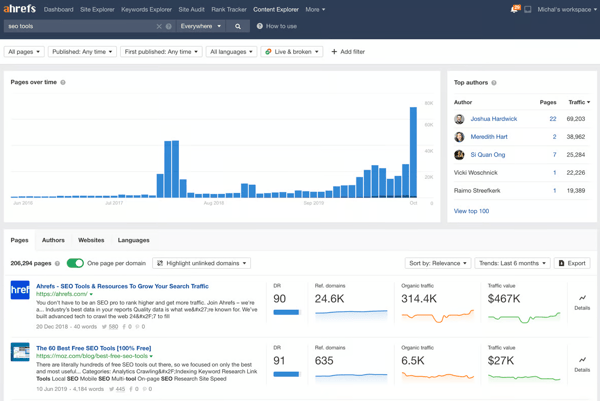
Another thing I love about Ahrefs is the free keyword research tool and the overview of my competitor data. Even with the free version, it gives me enough information to make smart choices about what to write next, which is a huge help when planning new blog posts or content refreshes.
However, while the free version is excellent for site audits and backlink analysis, it has limitations compared to the paid version—especially regarding the number of reports and data you can export.
What I like about Ahrefs:
- The site audit tool makes it easy for me to see what’s working and what’s not.
- The free version provides me with enough information to plan my content and target the right keywords.
- Ahrefs provides a solid overview of my competitors, which helps me identify opportunities and gaps in my content strategy.
What G2 users like about Ahrefs:
“The best thing about Ahrefs is its search engine capability and the accuracy of the data it gives on Google search. The way it provides us with the ranking, keywords, competitor’s website performance, backlink profile, advertising analysis, and so on is commendable. We’ve been using this tool for over 5 years and couldn’t be happier than ever. Ahrefs has made our digital marketing efforts a lot easier than ever. It requires a little bit of initial setup and implementation.”
– Ahrefs Review, Nayan P.
What I dislike about Ahrefs:
- The free version limits the number of reports and queries I can run.
- I also find the free version’s data a bit restricted, which may not be enough for detailed analysis.
What G2 users dislike about Ahrefs:
“I literally dislike the “content explorer” feature, which is bad at providing the desired results. Most of the time, it shows irrelevant things rather than providing quality outcomes/topics for generating content/blog.”
– Ahrefs Review, Yasir S.
Is Ahrefs worth paying for? Check out this guide packed with my team’s expertise to help you decide.
2. Semrush
When using Semrush, I quickly realized why it’s considered the go-to platform for SEO professionals. Even with free access, it offers great recommendations for keyword research, competitive analysis, and site audits.
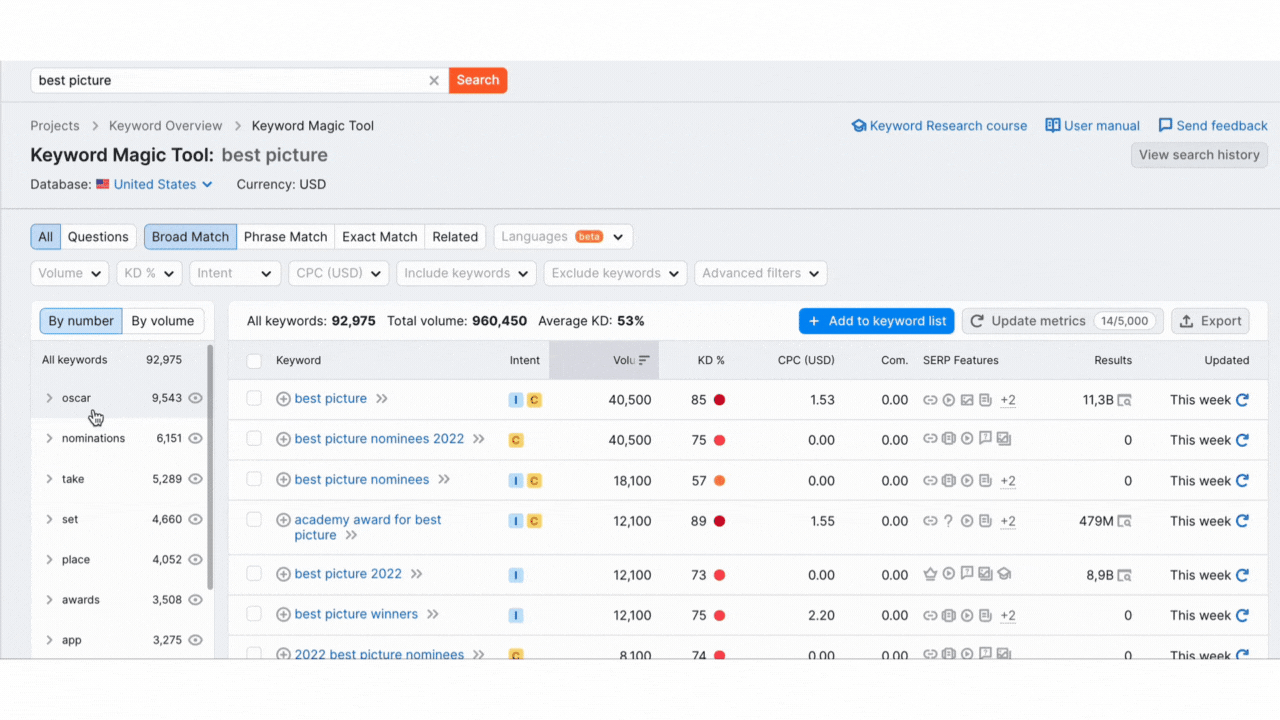
I was impressed by the free features, like the ability to analyze domain performance and get a snapshot of organic traffic, keyword rankings, and backlinks. I use this feature to analyze a competitor’s organic keywords and traffic estimates. The keyword magic tool also stood out for me. It made keyword research a breeze by suggesting related keywords and questions.
However, I often wished for more detailed takeaways into specific metrics, which suggests that the free version may not be sufficient to produce comprehensive reports.
What I like about Semrush:
- I love how the data is easy to read. The reports are clear and straightforward, making it simple for me to identify key learnings at a glance.
- The keyword magic tool is so easy to use, and I found related keywords and discovered new opportunities for targeting quick wins.
What G2 users like about Semrush:
“It’s a powerhouse tool that simplifies SEO, content marketing, and competitor analysis in one platform. The keyword research tool is great, offering insights into search volume, keyword difficulty, and related terms, which makes it easier to craft highly targeted campaigns. The Site Audit tool is another standout—it provides actionable recommendations to improve website health and boost search rankings.
Finally, the detailed reporting capabilities are valuable for presenting data to teams or clients. Whether managing multiple websites or refining one, Semrush gives you the data and insights to stay ahead in the digital space. It’s an essential tool for anyone serious about online marketing.”
– Semrush Review, Shannon E.
What I dislike about Semrush:
- The interface may feel slightly overwhelming to new users. I recommend exploring the tutorials to make the most of it.
- Some reports may lack customization. While the default settings are helpful, I want more control over filtering and sorting data for specific needs.
What G2 users dislike about Semrush:
“I dislike how many features there are. It’s a great tool but can also seem overwhelming when first starting. Since then, I’ve learned about all the different features I can access and how to maximize my subscription to the fullest. It can maybe just be jarring at first.”
– Semrush Review, Aubree H.
Get a free SEO audit checklist in our comprehensive guide on conducting an SEO audit correctly.
3. SE Ranking
SE Ranking was intuitive and easy to navigate. I did not need to dig through endless menus to find what I wanted. I started with their free 14-day trial and explored the rank tracking and website audit features.
I found the ranking tracker useful for monitoring local and global positions, allowing me to keep tabs across different search engines. The backlink checker was another highlight, letting me see who links to my site and where I stand in front of my competitors.
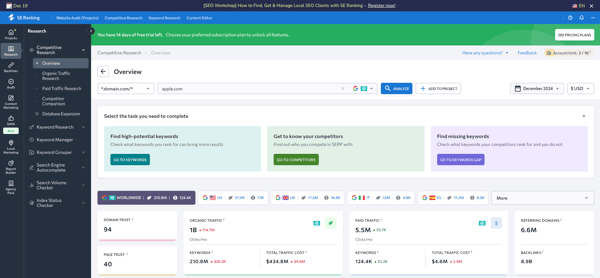
The keyword research tool was surprisingly detailed, even on the free plan. You can track keyword positions and get a glimpse of competitors’ keywords, which is excellent for building strategies. I liked how it updated data regularly to keep me informed, but I also felt it needed more customization.
Some features, like site audit, didn’t give me the tips I hoped for in the form of solid action steps rather than surface-level suggestions.
What I like about SE Ranking:
- The ranking tracker is great for keeping a close eye on my content pages on Google search results pages.
- The backlink checker is simple yet effective for understanding backlink profiles.
- The free trial gave me access to many features without requiring a paid plan.
What G2 users like about SE Ranking:
“I have compared SE Ranking side-by-side with other SEO tools such as Ahrefs, Semrush, and Moz. SE Ranking offers virtually all the tool modules of its competitors, plus additional features that others lack. One significant difference stands out: SE Ranking provides a much more cost-effective monthly subscription.
Many other tools rely on their long-standing reputations and assume their rising subscription fees will continue to be renewed. In contrast, SE Ranking consistently works hard to improve its product and offers it competitively. Overlooking this excellent software would be a mistake. I highly recommend starting an SE Ranking trial to experience this product’s effectiveness and polish.”
– SE Ranking Review, Jack V.
What I dislike about SE Ranking:
- The reporting features are solid overall, but some graph layouts didn’t clearly display trends as I would have liked.
- I found the customization options lacking with the keyword research tool. It would have been great to filter results, but the tool felt a bit rigid.
What G2 users dislike about SE Ranking:
“The keywords are not always adapted to all regions; it would be very useful to update the database and improve these options. I think they are the most important source of the product, but the system for analysis and updating of data is often slow, especially if you work in large volumes, which must be fractioned to make the most of them. The reports, although they do their job, can be improved in future updates.”
– SE Ranking Review, Adami M.
New algorithm update? Stay ahead on SERP by using these six strategies for Google AI overviews.
4. Moz Pro
I have been using Moz Pro intermittently for a couple of years. It offers a variety of SEO tools, such as link explorer, domain research, MozBar, etc., without any commitment to signing up or paying for premium plans.
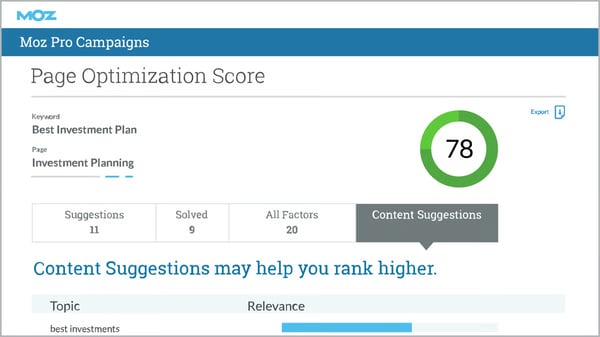
I love using Moz Link Explorer to understand my backlink profile. It helps me find new link-building opportunities and compares my backlinks to my competitors. Another feature that I use a lot is the on-page optimization tool. It identifies key areas on my pages that I can tweak to boost my rankings by outlining specific and actionable steps.
Although sometimes the interface feels a bit dated to me, the data it provides is solid. Plus, the MozBar browser extension is a nifty little addition that helps me with quick checks while I’m browsing the web.
What I like about Moz Pro:
- The Moz link explorer identifies backlinks and finds new link-building opportunities.
- The on-page optimization tool provides actionable steps to improve pages, helping me focus on the most critical areas.
- Moz’s user interface is generally clean, and I appreciate the learning resources the tool offers.
What G2 users like about Moz Pro:
“MozPro has a lot of features that are highly helpful if you want to improve the ranking of your website. The best feature that I find most helpful is the Monthly Report. One just has to set it up according to the preferences, and bingo, every month, you receive a customized report in your email. Not to mention, MOZ’s customer support and user-friendly interface are the driving forces behind its popularity.”
– Moz Pro Review, Sabeen N.
What I dislike about Moz Pro:
- The free version seems to restrict the amount of data I can pull, especially for competitive research.
- The interface is clean and user-friendly, but some more advanced tools have a learning curve.
What G2 users dislike about Moz Pro:
“I’d like to have more video training sessions available. As a visual learner, this would help the learning curve. I need reminders to check it more often – frequency of use matters.”
– Moz Pro Review, Kristi B.
5. SEO PowerSuite
What sets SEO PowerSuite apart for me is its unique combination of desktop app and cloud features. It gives me the flexibility to run SEO tasks offline while giving me access to cloud storage and reporting when needed.
I can create custom reports, segment data by keywords or locations, and adjust the tracking frequency. One feature I love is SEO SpyGlass, which gives me an overview of my competitors’ backlink profiles. It’s like having a magnifying glass on their link-building strategy, helping my team identify opportunities to acquire similar high-quality backlinks.
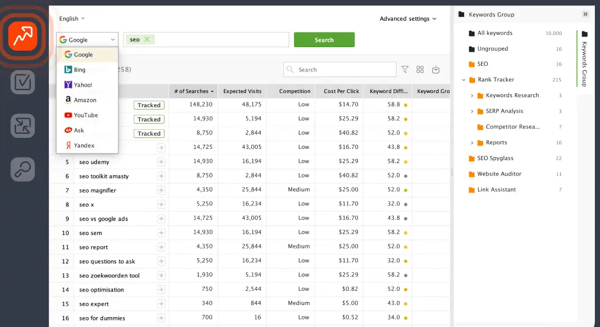
Another standout is the website auditor, which performs an elaborate site audit, highlighting everything from crawl errors to missing meta tags and slow-loading pages. It makes fixing issues incredibly simple, with clear, actionable advice on how to resolve each problem.
However, one thing to note is that SEO PowerSuite has many features and detailed reports. It’s not as simple as some cloud-based alternatives, so beginners need more time to utilize its full potential. But for power users looking for an all-in-one SEO suite, it’s worth trying.
What I like about SEO PowerSuite:
- I love that I can track rankings across multiple search engines like Bing and customize reporting frequency and location settings.
- The site audit feature gives me a detailed analysis of what’s working for my web pages’ performance.
What G2 users like about SEO PowerSuite:
“It’s very cost-effective. I can run unlimited queries and projects for one low fixed price, especially if you take advantage of their annual sales. Other SEO software gets expensive fast with more projects and search terms added. Also, I know the data collected is the most recent and not coming from a collective database that might be weeks or months old. Yes, running and getting the reports takes a little longer, but it’s not that bad with a high-speed internet connection and proxy rotation. And it works great on my Macbook Air! Thank you for having a Mac version.”
– SEO PowerSuite Review, Chris S.
What I dislike about SEO PowerSuite:
- While the desktop app is powerful, I miss the flexibility of web-based tools, which allow me to easily access my data from any device without installing software.
- I also feel that the setup process can be more helpful for easier navigation right from the start.
What G2 users dislike about SEO PowerSuite:
“You can’t save projects without purchasing the software, so you must start over every time, which is more than annoying. Every tool requires manual login to services like Analytics & Adwords. Tools take a long time to evaluate, preventing you from doing anything else with that particular tool. The rank check seems especially slow. Maybe that’s by design, as you can get blocked if you do too many search requests quickly.”
– SEO PowerSuite Review, Randy D.
Are you fully equipped to optimize your website’s visibility? When conducting your audit, avoid these common technical SEO mistakes.
6. Serpstat
Serpstat was one of the tools I was utterly unfamiliar with. But let me tell you, I am a fan. One of the things that worked well for me is the batch analysis feature. I can upload a list of URLs, and Serpstat will generate a comprehensive SEO report for each in minutes. This lets me quickly compare multiple sites for keyword rankings, backlinks, and overall performance.
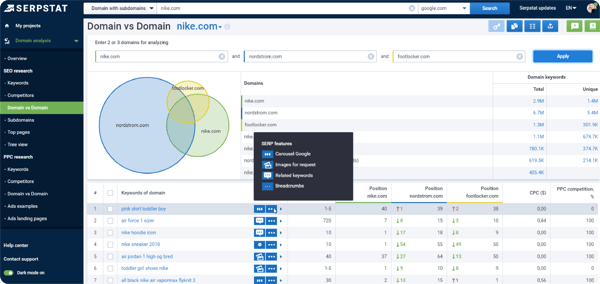
Serpstat is also remarkable for site comparison in one clean interface. This comparison includes SEO metrics and traffic estimates, helping me identify areas where my content is underperforming.
Another feature that I enjoyed using is the missing keyword tool. It identifies keyword opportunities that my competitors are ranking for, but I may have missed. This option makes it easy for me to find new possibilities to alter my content strategy by targeting relevant keywords and content gaps.
My main problem with the free version is that paid plans unlock deeper insights, especially in batch analysis and backlink tracking.
What I like about Serpstat:
- I can upload multiple URLs for instant comparison, saving me time on research and data analysis.
- Daily rank tracking is also great for making quick real-time adjustments based on fluctuations.
What G2 users like about Serpstat:
“What I like most about this tool, besides its good price, is undoubtedly the ability to correctly address all the necessary SEO-related issues with a friendly and fast interface. Excellent relationship between quality and price, as well as an opportunity for small fish to have real opportunities in the SERPs. Significant savings month after month as I get lost from much more expensive tools that do the same.
The multiple types of export options available, which directly include a Google Drive and PDF, plus updates and community blog training, are an excellent source of learning.
– Serpstat Review, Pedro Luis C.
What I dislike about Serpstat:
- The volume of data I can access on lower-tier plans feels restrictive, especially for larger projects.
- Some of the heavy data tasks sometimes resulted in slower response speeds.
What G2 users dislike about Serpstat:
“If you’re new to the world of SEO software, setting up Serpstat might feel a bit overwhelming at first. However, don’t let that deter you. Once you dive in and get a feel for its robust tools and capabilities, you’ll be amazed. The only minor issue is the sheer abundance of tools available, which might take some time to fully explore.”
– Serpstat Review, Olena S.
7. Similarweb
For me, Similarweb was quite insightful in understanding webpage traffic and audience behavior. It focuses heavily on competitive traffic analysis, making it invaluable for benchmarking my page performance.
The traffic source analysis was one of the top features that worked for me. It breaks down where my visitors are coming from—organic search, social media, and direct or referral traffic. This level of granularity helps me identify which channels are working best and which ones have the potential to ramp up.
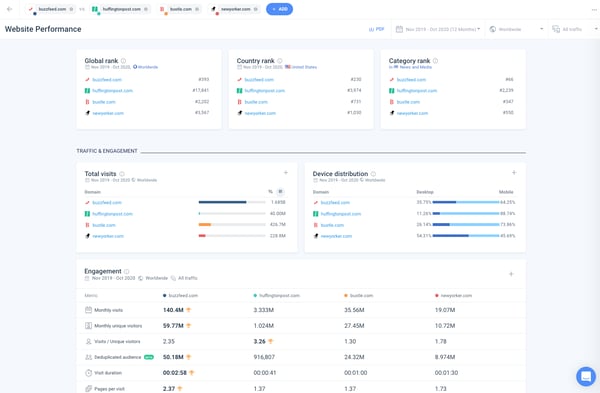
The audience insights feature is also beneficial. It provides data on visitor demographics, interests, and other frequently visited sites. This information isn’t just useful for SEO—it’s a goldmine for refining content strategy and targeting the right audience with tailored campaigns.
That said, I feel Similarweb will benefit from having more detailed filtering options to narrow down results based on specific needs.
What I like about Similarweb:
- I value the ability to monitor traffic across channels.
- I also like its data on demographic and behavioral patterns, which helps in understanding user intent and preferences.
- The industry benchmark tool lets me see how my site stacks up against industry standards.
What G2 users like about Similarweb:
“I use Similarweb to benchmark our closest competitors every month. It is the best way to assess marketing performances not only on top of internal data but also learn about competitors’ best practices (e.g., referrals list, top search keywords, and sources of traffic). My team (especially Product Managers) is also leveraging the tool to get insights on customer behavior and spot axes of improvements. To sum up, this user-friendly tool is a must-have, providing a lot of valuable information and data on your own website and your competitors.”
– Similarweb Review, Thibault D.
What I dislike about Similarweb:
- Traffic data isn’t always shown in real time, which was a big drawback for me.
- For someone like me who loves digging into data, the free plan proved to be a bit basic.
What G2 users dislike about Similarweb:
“While it’s not a matter of disliking SimilarWeb, one challenge I’ve encountered is the abundance of features. With so many features, it can be overwhelming to determine which specific feature will best address a particular question or analysis. For example, when investigating a drop in our recent organic traffic, I was unsure which feature would provide the most relevant insights. Clarity on feature selection would greatly enhance the platform’s usability and help users like me navigate the information available.”
– Similarweb Review, Jessica H.
8. Seobility
In my experience, Seobility was accessible and straightforward for tackling core SEO tasks. The tool focuses on improving website performance, making it a fantastic choice for those who want to balance usability and functionality.
The feature that immediately stood out for me is the TF*IDF analysis tool. It evaluated the relevance of keywords in my content compared to top-ranking pages on SERP. I liked how it went beyond basic keyword optimization, helping me refine my content to match search intent without overstuffing keywords. It’s convenient when I’m optimizing long-form content or targeting competitive queries.
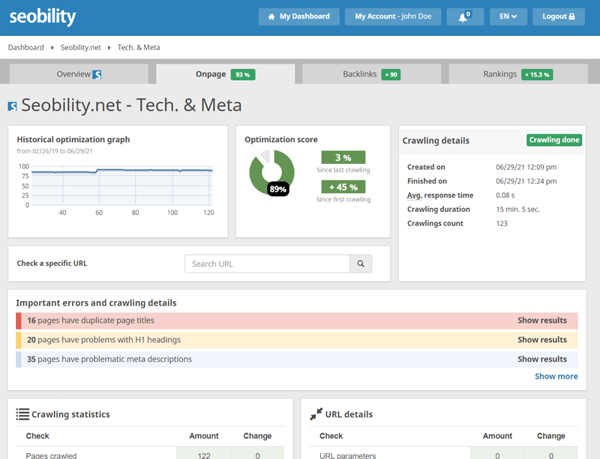
The page monitoring function was also valuable for me because it automatically tracked changes and identified issues like a broken link or missing meta tag. The backlink tool may not be as detailed as other tools like Ahrefs, but I still think it’s reliable for a basic overview.
The free version is quite generous as it offers a complete website audit. However, it did limit my access to other tools. The premium version becomes necessary for power users like me who need more frequent monitoring or expanded functionality.
What I like about Seobility:
- Seobility is quite beginner-friendly, with its clean design that’s easy to navigate and reports that are easy to follow.
- The page monitoring feature also offers the option of alerts by tracking changes and errors and allowing me to track any critical site issues.
What G2 users like about Seobility:
“As a small business owner relying on e-commerce sales, I have tried several SEO analysis sites. I find myself coming back to Seobility time and time again. Their analysis results are swift and comprehensive and offer clear suggestions for improvements.”
– Seobility Review, Stian L.
What I dislike about Seobility
- Compared to other enterprise-level SEO tools, Seobility lacks depth in areas like backlink analysis.
- The reports suit beginners, but power users may need more robust reporting options.
What G2 users dislike about Seobility:
“There are a few times when I reach my personal limits in implementing recommendations. It would be great to be given more detailed information on how to achieve the recommended goals. But maybe that’s asking too much of an analysis tool.”
– Seobility Review, Oliver P.
Check out our latest small business SEO guide to strategically improve your local SEO rankings.
9. SEOptimer
For me, SEOptimer was the tool that offered simplicity and speed simultaneously, making it ideal for anyone new to SEO. Instead of trying to do everything, SEOptimer excels at delivering quick website audits with practical steps, making it perfect for those who want results without a steep learning curve.
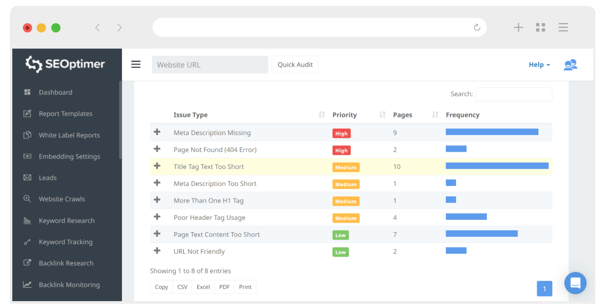
One of SEOptimer’s features I loved testing is the white-label reporting, which generates branded reports for technical audits, SEO scores, and improvement suggestions. This was especially helpful in sharing my findings without spending hours on customization.
Another area where SEOptimer shines is the multi-language support, offering audits in over 20 languages. This rare feature makes it a strong option for businesses targeting international audiences.
That said, I only recommend SEOptimer for smaller websites or beginners. Advanced users or those managing multiple domains may find the tool’s functionality limiting.
What I like about SEOptimer:
- The SEO audit reports are pretty easy to read and provide an overview of a website’s SEO health.
- The ability to perform audits in over 20 languages makes it invaluable for international SEO efforts.
What G2 users like about SEOptimer:
“What I like best about SEOptimer is its ability to provide clear, actionable recommendations after a detailed SEO audit. The user-friendly reports make it easy to identify and address critical SEO issues, even for those without deep technical knowledge. The white-label reporting feature also stands out, allowing for professional presentation to clients.”
– SEOptimer Review, Marius A.
What I dislike about SEOptimer:
- The biggest challenge I faced with SEOptimer was the lack of real-time metrics.
- The tool may be more relevant for smaller websites only.
What G2 users dislike about SEOptimer:
“The only downside to SEOptimizer for me is the time that it takes to obtain results – it also has a tendency to crash if overused or used continuously during the day.”
– SEOptimer Review, Lavanya N.
10. AccuRanker
Using AccuRanker has been incredibly helpful for me in managing rank tracking. I was impressed by its emphasis on keyword performance monitoring. AccuRanker made it easy for me to track rankings and spot traffic changes quickly, which is essential for refining my refresh strategies and staying competitive on SERP. The most useful part of AccuRanker is its speed, accuracy, and real-time updates.
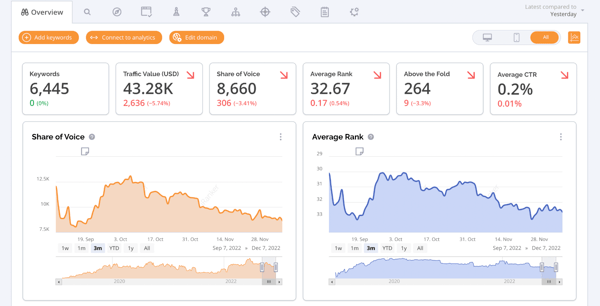
It also follows the share of voice (SoV) metric, a great way to measure how much search visibility I’m capturing across keywords. The SoV view helps me prioritize efforts beyond individual keyword rankings, especially when managing more extensive projects.
The SERP analysis tool is also handy. It doesn’t just show rankings; it gives me a breakdown of all the SERP features for broad and long-tail keywords, such as featured snippets, schema, or “people also ask” queries. This has helped me tailor my content to win SERP features and optimize for other search opportunities.
I still need other SEO tools to cover functions like audit and competitive research, but AccuRanker does everything it’s supposed to do for rank tracking.
What I like about Accuranker:
- I can refresh rankings instantly, which is perfect for staying on top of any SERP changes.
- Tracking SoV gives me a clear sense of how much visibility my content is capturing.
What G2 users like about Accuranker:
“AccuRanker is easy to use, which is important to me because the learning curve is shallow, so it’s easy to master. It helped me to get started quickly. I didn’t encounter any problems when I set up my account. I can easily navigate through their website and do things on my own. Even setting up the integrations was a breeze. I discovered more keyword ideas I could track by integrating Google Analytics and Google Search Console.
The accuracy of Google rank tracking is top-notch, and you can refresh the data every 24 hours. I can also monitor multiple sites in one dashboard, which is very convenient. I tried to contact their support team and got a prompt, thorough response. Overall, I’m very happy with this app and won’t look elsewhere for tracking keywords. Highly recommended.”
– Accuranker Review, Abraham C.
What I dislike about Accuranker:
- The tool primarily focuses on rank tracking, limiting its use as a standalone SEO tool.
- Upgrading may be costly for smaller businesses and individual users.
What G2 users dislike about Accuranker:
“The navigation in the system can sometimes be a little bit confusing. They recently updated their UI, but I liked the old one better. I’m not saying the new one is bad; I was just accustomed to the old user interface.”
– Accuranker Review, Jesper N.
Comparison of the best free SEO tools
| Free SEO software | G2 Rating | Free plan | Ideal for |
| Ahrefs | 4.5/5 | Limited free tools available | Professionals looking for backlink analysis and keyword research. |
| Semrush | 4.5/5 | Limited free access | Comprehensive SEO and competitive analysis for digital marketers. |
| SE Ranking | 4.8/5 | 14-day free trial | Small businesses and startups needing versatile SEO tools on a budget. |
| Moz Pro | 4.3/5 | 30-day free trial | Advanced users focused on site audits and on-page SEO. |
| SEO PowerSuite | 4.6/5 | Free version with limited features | Agencies and individuals needing desktop-based SEO solutions. |
| Serpstat | 4.6/5 | Limited free access | Marketers focused on keyword clustering and PPC insights. |
| Similarweb | 4.5/5 | Free version with limited data | Users interested in website traffic insights and competitor analysis. |
| Seobility | 4.6/5 | Free plan with limited features | Beginners and small teams looking for affordable SEO health checks. |
| SEOptimer | 4.5/5 | Free website audit tool | Website owners needing quick and actionable audit insights. |
| AccuRanker | 4.8/5 | 14-day free trial | Professionals focused on rank tracking and monitoring. |
Frequently asked questions about free SEO tools
Have more questions? Find more answers below.
Can SEO be done for free?
Absolutely. Using tools like Seobility, Moz Pro, and other free tools I tested, you can handle essential SEO tasks such as site audits, keyword research, and rank tracking without spending a dime.
What are some free SEO tools that are as effective as paid ones?
Ahrefs’ free tools and SEOptimer’s audit features come close to paid alternatives for smaller-scale tasks. Serpstat and Seobility also provide functionality that rivals their premium counterparts.
What are the best free SEO tools for beginners?
Seobility and SEOptimer have intuitive interfaces that are beginner-friendly, while Ahrefs’ free tools provide reliable starting points for keyword and backlink analysis.
What are the best free SEO tools for YouTube?
For YouTube, Similarweb helps analyze traffic sources, while Serpstat can share recommendations for video-related keyword trends. These tools can guide optimization strategies for video content.
What are the best free SEO keyword tools?
Semrush’s keyword magic tool, Ahrefs keyword generator, and Serpstat’s keyword analysis tool are excellent for finding high-impact keywords. SE Ranking’s free trial also offers robust keyword tracking features.
Does Google have free SEO tools?
Yes, Google provides free tools like Google Search Console for performance monitoring, Google Analytics for traffic data, and Google Keyword Planner for keyword research. These tools are excellent complements to the other free SEO tools mentioned above.
SEO your way to the top
After testing these tools, it’s clear to me that free SEO tools can still improve website performance and visibility.
Each tool on my list offers something unique. While some features are limited in the free versions, they’re enough to tackle essential SEO tasks like rank tracking, backlinks analysis, keyword research, and content optimization.
Whether you’re just starting or looking to complement your existing toolkit, these options prove that you don’t need a massive budget to make meaningful progress in SEO.
For me, the best approach is finding the right combination of tools that align with my goals. Experiment, explore, and see which ones best fit your workflow. SEO is a marathon, not a sprint—these tools can help you stay ahead.
Planning SEO strategy? Check out the latest SEO statistics to stay competitive in 2025 and beyond.


